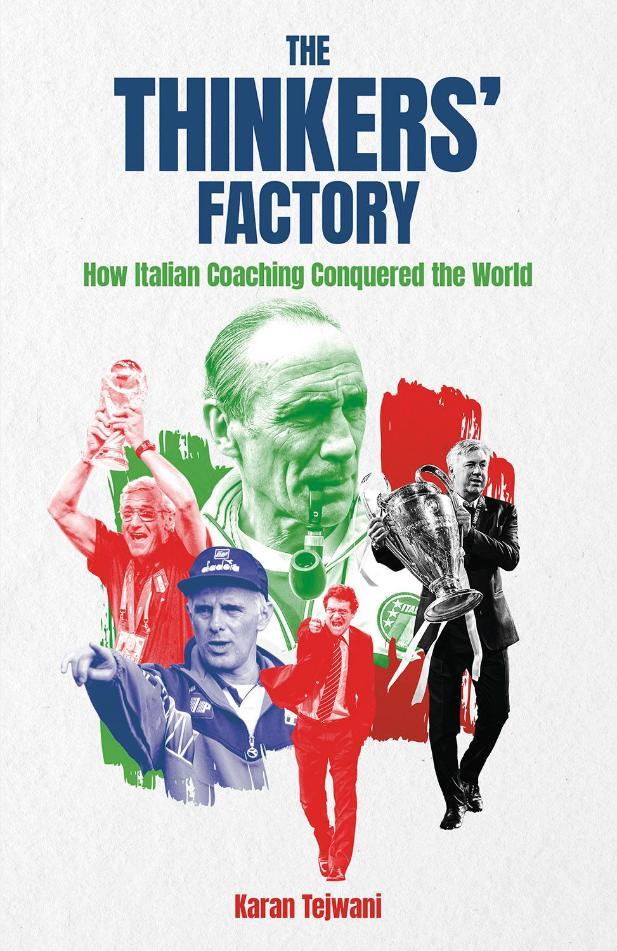The Thinkers' Factory
26/06/2024 - 2.54
Karan Tejwani
It’s often easy to dismiss the nature and history of Italian football as being the one where defensiveness reigns supreme. While some elements of that are true, if you were to go back decades, you’d see why it tends to be that way, and why Italians just do football differently from the rest.
They’re thorough, detailed and it's drilled in their coaches to be that way. Their teachings and trainings go back almost a century. From the Benito Mussolini-influenced world champions of the 1930s to the creation of the Coverciano finishing school in Florence to Enzo Bearzot’s silent champions, Marcello Lippi’s defiance of the odds and more, Italy and calcio has stories for the ages.
The Thinkers’ Factory is my attempt at encapsulating over 100 years of history into one book. Italy are four-time World Champions, with several league and Champions League winners produced, but what goes behind building these heroes is far more fascinating.

Throughout my life, Italian coaches have led brilliant teams. Marcello Lippi’s Italy won the first World Cup I can remember, while Carlo Ancelotti’s Milan were successful in the first Champions League final my memory can recall – although I had no idea of who they were at the time. Roberto Mancini’s Manchester City won the Premier League in the most dramatic way possible. Claudio Ranieri did the same with a Leicester team married to miracles. Antonio Conte’s Juventus and Chelsea were often impressive. Mancini, again, created one of my favourite international teams in one of my favourite international tournaments with Italy at Euro 2020, and Ancelotti’s Real Madrid found new ways to win in Europe in 2022.
Bringing all of that together – and plenty about its history – became something I was obsessed with. This book covers over a century of Italian coaching, but not just through a tactical lens. Italian football is merged with a political and societal influence, and that is represented in the book too. The Thinkers’ Factory looks at changes over time, key figures in Italian football, and how its coaches became the world’s most revered.
Of course, delving into its history was important too, and that proved to be the most challenging aspect of this book. Writing with accuracy about events that happened about 100 years ago in fascist Italy was complicated, but it was worthwhile learning. Learning about Mussolini and Leandro Arpinati’s (one of Mussolini’s most trusted members of staff) work was fascinating, but almost harrowing at times. How they tried to convince Italy that football was a sport that was against Italian values before folding and determining that it was something they showed great interest in as a result of the public interest in calcio was interesting.
The creation of new sport
They even tried creating their own sport: volata. Volata combined football, basketball and rugby as two teams of eight players took to a slightly smaller football field and played three 20-minute periods. Hands and feet could be used to control the ball, albeit for no more than three seconds, and players could be held back by holding down their waist in a non-violent manner. In its heyday, each game kicked off with the fascist salute. In the summer of 1929, the sport’s first official game took place and over 15,000 players across Italy played the sport at some level. A year later, its first championship was held, won by Richard Ginori Milan, a chinaware factory, with Mussolini in attendance at the final.
In the coming years, countries across Europe requested information on the new sport, but it didn’t catch on. Interest in Italy rapidly decreased as well, with football still being the undisputed favourite. By 1933, Turati was exiled from Italy and pumping money into volata was no longer feasible. Within five years of the sport’s launch, it was almost non-existent. Calcio had captured Italy. And while Mussolini wasn’t too keen on that, nor able to spark an interest in football, he understood politics, and shifted his focus to gaining control over that – essentially, what is now known as sportswashing.
Here comes Pozzo
There was also the era of Vittorio Pozzo, a devout Italian, as evident by his participation in the First World War, and beyond that, he was an organisational genius, intent on making big differences in Italian football. He was a man of many gifts, working as a manager of Pirelli, the tyre company, while also being a journalist and an expert on regulations. Inspired by the Austrian genius Hugo Meisl and English legend Herbert Chapman, he developed his own methods and routines, finding a fluency between the Metodo and Sistema – the two prominent tactical innovations at the time.
His greater success, though, was convincing the fascist regime that oriundi - Italians with foreign origins - were allowed to be a part of the national team. The most prominent call-up was that of Raimundo Orsi, widely believed to be the finest winger in the game at the time, who was signed by Juventus a year prior to Pozzo taking over the national team despite rules preventing signings of foreign talent, meaning he was unused as a player. Although the use of oriundi was previously frowned upon by Arpinati, Pozzo managed to convince Arpinati to allow him, to a point where the politician once said: “According to Italian law, the children of Italians born abroad are considered as Italians, in this and every possible way.” This was Pozzo’s first great success, before he went on to win two World Cups.
Italian football has now shifted away from the era of fascism and their work in the game is respected the world over. Since the time, they were damaged by the effects of the war, went through tragedy with the loss of the famous Torino side of the 1940s and took until the 1960s with the emergence of Nereo Rocco and Helenio Herrera’s Milan and Inter sides to rebuild fully. The national team took slightly longer than that, but there’s been an emergence of fine coaches to follow in Pozzo’s footsteps.
The Thinkers’ Factory is out on 29 July 2024 by Pitch Publishing.
Biography
Karan Tejwani is a journalist and lecturer. He has covered football for over eight years. The Thinkers’ Factory will be his third book, having previously written Glorious Reinvention (2022) and Wings of Change (2020).



/prod01/wlvacuk/media/departments/digital-content-and-communications/images-2024/240624-Alumni-Awards-2024-Resized.jpg)
/prod01/wlvacuk/media/departments/digital-content-and-communications/images-18-19/220325-Engineers_teach_thumbail.jpg)
/prod01/wlvacuk/media/departments/digital-content-and-communications/images-2024/240627-UN-Speaker-Resized.jpg)
/prod01/wlvacuk/media/departments/digital-content-and-communications/images-2024/240320-Uzbekistan-Resized.jpg)
/prod01/wlvacuk/media/departments/digital-content-and-communications/images-2024/240229-The-Link-Resized.jpg)
/prod01/wlvacuk/media/departments/digital-content-and-communications/images-2024/240627-Lady-Aruna-Building-Naming-Resized.jpg)